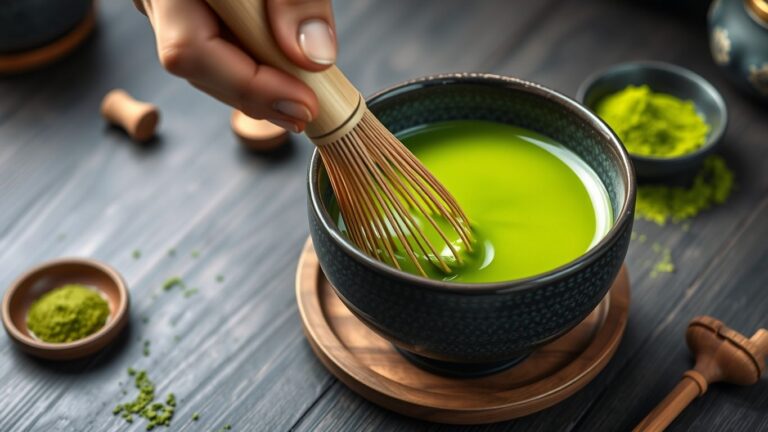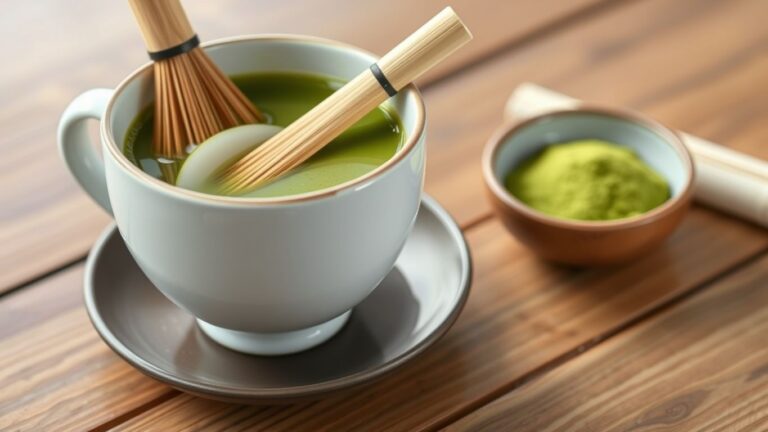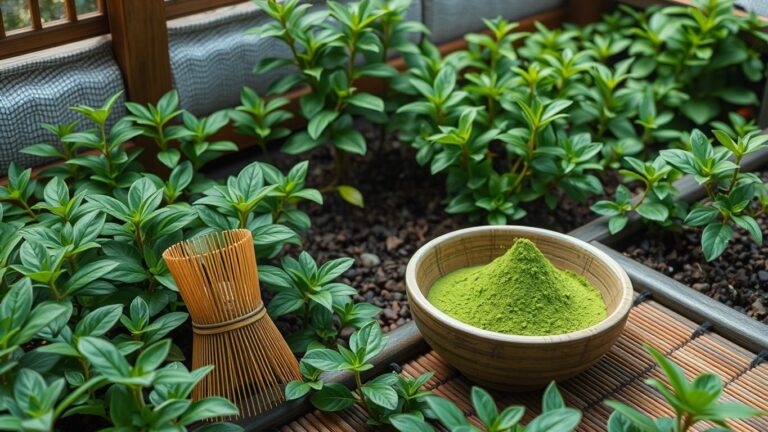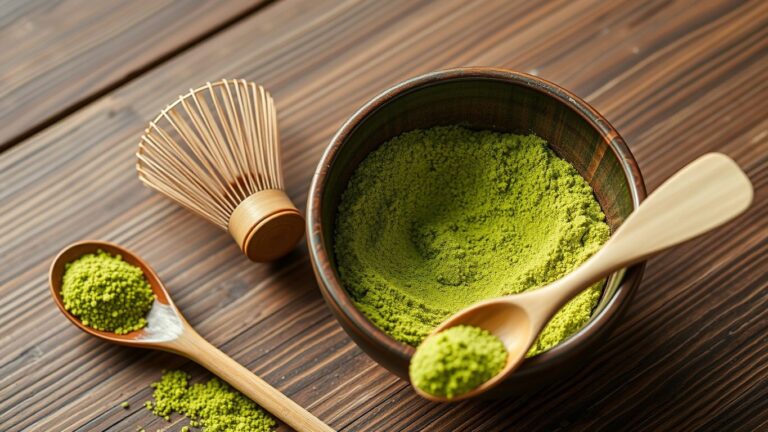Pregnancy is a time filled with joy and questions, especially about what you can eat and drink. One popular beverage that many expectant mothers are curious about is matcha. This powdered green tea is known for its health benefits, but is it safe to consume while pregnant? Let’s dive into what you need to know.
Key Takeaways
- Matcha contains caffeine, so it’s important to monitor your intake to stay within safe limits during pregnancy.
- Matcha is rich in antioxidants, which can be beneficial for both the mother and the developing baby.
- Some studies suggest that high consumption of green tea, including matcha, may affect folate absorption, a crucial nutrient during pregnancy.
- Always consult your healthcare provider before adding matcha to your diet to ensure it’s safe for you and your baby.
- Opt for high-quality, organic matcha to reduce the risk of contaminants and ensure you’re getting the best nutrients.
Understanding Matcha: What It Is and Its Nutritional Profile
Origins and Cultivation of Matcha
Matcha is a special type of green tea from Japan. Unlike regular green tea, matcha is grown in the shade for about three weeks before harvest. This process boosts the levels of chlorophyll and amino acids, giving matcha its bright green color and unique taste. After harvesting, the leaves are steamed, dried, and ground into a fine powder.
Nutritional Components of Matcha
Matcha is packed with nutrients. It is rich in various types of minerals such as potassium, calcium, phosphorus, magnesium, iron, and zinc. Additionally, matcha contains vitamins like vitamin C, vitamin A, and vitamin E. One of the standout features of matcha is its high antioxidant content, particularly catechins, which help fight off harmful free radicals in your body.
How Matcha Differs from Regular Green Tea
While both matcha and regular green tea come from the same plant, Camellia sinensis, they are quite different. In regular green tea, the leaves are steeped in hot water and then removed. With matcha, you consume the entire leaf in powdered form, which means you get more nutrients and antioxidants. This makes matcha a more concentrated source of the benefits found in green tea.
Matcha’s unique cultivation process and nutritional profile make it a powerful addition to your diet, offering more concentrated benefits than regular green tea.
Caffeine Content in Matcha: What Pregnant Women Need to Know
When you’re pregnant, it’s important to keep an eye on your caffeine intake. Matcha, a powdered green tea, contains caffeine, but how does it compare to other beverages? Let’s dive into the details.
Comparing Caffeine Levels: Matcha vs. Other Beverages
Matcha has more caffeine than regular green tea but less than coffee. Here’s a quick comparison:
| Beverage | Caffeine per 8 oz cup |
|---|---|
| Matcha | 70 mg |
| Green Tea | 30-50 mg |
| Brewed Coffee | 95-165 mg |
So, if you’re trying to stay within the recommended caffeine limit, you could have about 2-3 cups of matcha a day. But remember, moderation is key.
Safe Caffeine Intake During Pregnancy
Health experts suggest that pregnant women should limit their caffeine intake to 200 mg or less per day. This includes all sources of caffeine, not just matcha. Too much caffeine can lead to complications like low birth weight or preterm labor.
For pregnant women, it is necessary to further reduce the intake, and it is recommended to keep daily caffeine intake during pregnancy to 200mg or less.
Tips for Monitoring Your Caffeine Consumption
Here are some tips to help you keep track of your caffeine intake:
- Read Labels: Check the caffeine content on beverage labels.
- Keep a Journal: Write down what you consume each day to monitor your intake.
- Consult Your Doctor: Always talk to your healthcare provider about your diet and caffeine consumption.
By staying informed and mindful, you can enjoy matcha safely during your pregnancy.
Potential Benefits of Drinking Matcha During Pregnancy
Rich in Antioxidants
Matcha is packed with antioxidants, especially catechins. These compounds help protect your cells and DNA from damage. Antioxidants are crucial during pregnancy as they fight oxidative stress, which can harm both you and your baby.
Stress Relief Through L-Theanine
Feeling stressed? Matcha contains L-theanine, an amino acid known for its calming effects. This can be particularly helpful for pregnant women dealing with anxiety or stress related to their pregnancy.
Nutrient Boost for Fetal Development
Matcha is a good source of important nutrients like vitamin C, vitamin A, and iron. These nutrients are essential for your baby’s development. Including matcha in your diet can give you and your baby a healthy boost.
Risks and Considerations: Is Matcha Safe for Pregnant Women?

Caffeine and Its Effects on Pregnancy
Caffeine is a well-known stimulant that can cross the placenta and reach your baby. This means that your baby is exposed to caffeine whenever you consume it. Current guidelines suggest limiting caffeine intake to 200 milligrams per day during pregnancy. Matcha, being a concentrated form of green tea, contains more caffeine than regular green tea. On average, one cup of matcha can have between 25 to 70 milligrams of caffeine, depending on the concentration and serving size. Therefore, it’s crucial to monitor your matcha intake to stay within safe limits.
Impact on Folate Absorption
Folate is an essential nutrient during pregnancy, especially in the first trimester, as it helps prevent birth defects like spina bifida. However, catechins, the antioxidants found in matcha, can inhibit the absorption of folate. Studies have shown that consuming large amounts of green tea can lower serum folate levels, which could increase the risk of birth defects. To minimize this risk, it’s advisable to limit your matcha consumption and ensure you’re getting enough folate from other sources.
Potential Contaminants in Low-Quality Matcha
Not all matcha is created equal. Low-quality matcha can contain contaminants like heavy metals and pesticides, which are harmful to both you and your baby. To avoid these risks, always opt for high-quality, organic matcha. This ensures that the matcha you consume is free from harmful substances. Making your matcha at home can also give you better control over the serving size and caffeine content.
How Much Matcha Is Safe to Consume While Pregnant?

Recommended Daily Intake
For pregnant women, it is necessary to further reduce the intake, and it is recommended to keep daily caffeine intake during pregnancy to 200mg or less. Given that 1 gram of high-quality matcha contains between 35-50mg of caffeine, you can safely enjoy up to four servings of matcha per day. This is roughly equivalent to two large matcha green teas a day, each made with a teaspoon of matcha.
Factors Affecting Caffeine Levels in Matcha
The caffeine content in matcha can vary significantly based on several factors:
- Quality of Matcha: Higher quality matcha tends to have more caffeine.
- Growing Conditions: How the matcha is grown and harvested can impact caffeine levels.
- Preparation Method: The amount of matcha powder used and how it is prepared can also affect caffeine content.
Choosing High-Quality, Organic Matcha
To minimize potential exposure to contaminants like pesticides, it’s crucial to choose high-quality, organic matcha. Organic matcha is grown without synthetic pesticides and fertilizers, making it a safer option for you and your baby. Always buy from reputable sources to ensure you’re getting the best quality product.
Moderation is key when consuming matcha during pregnancy. Always consult your healthcare provider to tailor your intake to your specific needs and circumstances.
Consulting Your Healthcare Provider About Matcha

Why Professional Advice Matters
When it comes to consuming matcha during pregnancy, it’s crucial to consult your healthcare provider. Every pregnancy is unique, and what works for one person may not be suitable for another. Your doctor can provide personalized advice based on your specific health needs and circumstances.
Questions to Ask Your Doctor
Here are some important questions to discuss with your healthcare provider:
- Is it safe for me to drink matcha during my pregnancy?
- How much matcha can I safely consume each day?
- Are there any potential interactions between matcha and my prenatal vitamins or medications?
- Should I avoid matcha during any particular trimester?
- Are there any signs I should watch for that indicate I should stop drinking matcha?
Personalizing Your Dietary Choices
Your healthcare provider can help you tailor your diet to ensure it meets your nutritional needs while keeping you and your baby safe. They can offer guidance on how to incorporate matcha into your diet without exceeding the recommended caffeine intake. Remember, it’s always better to err on the side of caution and seek expert advice when in doubt.
For information about consuming matcha during pregnancy, always consult with your primary care physician or obstetrician and seek expert advice. Matcha is a popular choice, but professional guidance is essential to ensure it’s safe for you and your baby.
Incorporating Matcha into a Pregnancy-Safe Diet
Delicious Matcha Recipes for Expecting Mothers
Incorporating matcha into your diet can be both fun and nutritious. Here are a few simple recipes to get you started:
- Matcha Smoothie: Blend a teaspoon of matcha powder with a banana, a handful of spinach, a cup of almond milk, and a spoonful of honey. This smoothie is packed with nutrients and is a great way to start your day.
- Matcha Oatmeal: Add a teaspoon of matcha powder to your morning oatmeal. Top with fresh berries and a drizzle of maple syrup for a delicious and healthy breakfast.
- Matcha Yogurt Parfait: Layer matcha-infused yogurt with granola and fresh fruit. This parfait makes for a perfect snack or light breakfast.
Pairing Matcha with Nutrient-Rich Foods
To maximize the benefits of matcha, pair it with foods rich in essential nutrients. Here are some ideas:
- Iron-Rich Foods: Pair your matcha with iron-rich foods like spinach, lentils, and lean meats to help counteract any potential decrease in iron absorption.
- Folate-Rich Foods: Enjoy matcha alongside folate-rich foods such as avocados, oranges, and leafy greens to support fetal development.
- Calcium-Rich Foods: Combine matcha with calcium-rich foods like yogurt, cheese, and almonds to support bone health.
Timing Your Matcha Intake
When you drink matcha can be just as important as how much you drink. Here are some tips for timing your matcha intake:
- Morning Boost: Start your day with a matcha latte or smoothie for a gentle caffeine boost that won’t leave you jittery.
- Between Meals: Drink matcha between meals to avoid interfering with the absorption of important nutrients from your food.
- Avoid Late Evenings: Since matcha contains caffeine, it’s best to avoid drinking it late in the evening to ensure a good night’s sleep.
Remember: Matcha can be part of a healthy pregnancy diet when consumed in moderation. It contains antioxidants, vitamins, and minerals to support overall health. However, always consult with your healthcare provider before making any significant changes to your diet during pregnancy.
Alternatives to Matcha: Other Pregnancy-Safe Beverages
Herbal Teas and Their Benefits
If you’re concerned about the caffeine content in matcha or just want to explore other options, there are several alternatives you can consider during pregnancy. Herbal teas are a popular choice. Non-caffeinated herbal teas like chamomile, peppermint, and ginger can be a soothing and safe choice during pregnancy. Just be sure to avoid herbs that may not be safe for pregnant women, like licorice root and some blends containing raspberry leaf.
Decaffeinated Options
If you still crave the taste of green tea without the caffeine, you can opt for decaffeinated green tea, which has a lower caffeine content than matcha. This way, you can enjoy the flavor without worrying about your caffeine intake.
Hydration Tips for Pregnant Women
Staying hydrated is crucial during pregnancy. For a simple, caffeine-free drink, try warm water with a squeeze of fresh lemon. This can be a refreshing and hydrating option for pregnant women. Remember, it’s important to drink plenty of fluids throughout the day to support your health and your baby’s development.
Always consult your healthcare provider before making any dietary changes during pregnancy, especially if you have any concerns or medical conditions.
Common Myths About Matcha and Pregnancy

Debunking Misconceptions
There are many myths about drinking matcha while pregnant. One common myth is that you can’t have caffeine while pregnant. However, recent studies show that a moderate amount of caffeine is likely safe for you and your developing baby. It’s important to know the facts so you can make informed choices.
Scientific Evidence vs. Anecdotal Claims
Many people rely on personal stories when it comes to pregnancy advice. While these stories can be helpful, they are not always based on science. For example, some people believe that matcha can cause miscarriage or preterm labor, but there is no scientific evidence to support this claim. Always look for scientific studies to back up any advice you hear.
Making Informed Decisions
When it comes to your health and your baby’s health, it’s crucial to make decisions based on reliable information. Talk to your healthcare provider about any concerns you have. They can help you understand the risks and benefits of drinking matcha during pregnancy. Remember, professional advice matters.
Real Stories: Pregnant Women and Their Matcha Experiences
Personal Testimonials
Many expecting mothers have shared their experiences with drinking matcha during pregnancy. Some have found it to be a comforting ritual, while others have had concerns. For instance, one mom mentioned, "I’ve had a couple iced matcha lattes from local coffee shops. I think it’s fine every week or two." Another mom shared, "I’m thinking I’ll go back to matcha lattes in the second trimester." These personal stories highlight the varied approaches and feelings about matcha consumption during pregnancy.
Balancing Cravings and Health
Pregnancy often comes with cravings, and for some, matcha is a favorite. One mom-to-be said, "I absolutely LOVE this mix," referring to her favorite iced matcha tea latte. However, balancing these cravings with health considerations is crucial. It’s important to monitor your intake and ensure it aligns with recommended guidelines.
Lessons Learned from Other Moms
Hearing from other moms can provide valuable insights. Some have found that drinking matcha in moderation works well for them, while others prefer to avoid it altogether. One mom advised, "Depending on the authenticity, matcha leaves tend to contain higher levels of lead too. It’s safe for adult consumption, but definitely not for kids so I would be hesitant drinking matcha regularly while pregnant." These lessons can help you make informed decisions about your own matcha consumption during pregnancy.
Remember, every pregnancy is unique. What works for one person may not work for another. Always consult with your healthcare provider to make the best choices for you and your baby.
Conclusion
In conclusion, drinking matcha during pregnancy can be a safe and enjoyable experience if done in moderation. While matcha offers numerous health benefits, such as antioxidants and essential nutrients, it’s important to be mindful of its caffeine content. Always consult with your healthcare provider to ensure it fits well with your pregnancy plan. By staying informed and making thoughtful choices, you can enjoy the unique flavors and benefits of matcha without compromising your or your baby’s health. Cheers to a healthy and happy pregnancy journey!
Frequently Asked Questions
Can I drink matcha while pregnant?
Yes, you can drink matcha while pregnant, but it’s important to do so in moderation due to its caffeine content. Most health experts recommend pregnant women limit their caffeine intake to 200 mg per day.
How much matcha is safe to consume during pregnancy?
It is generally safe to consume 1-2 cups of matcha per day while pregnant. Each cup contains about 25-70 mg of caffeine, depending on the quality and preparation.
What are the benefits of drinking matcha during pregnancy?
Matcha is rich in antioxidants, helps relieve stress due to L-theanine, and provides nutrients important for fetal development, such as vitamin C, vitamin A, and iron.
Are there any risks associated with drinking matcha during pregnancy?
Yes, there are some risks. Matcha contains caffeine, which can affect pregnancy if consumed in large amounts. It can also impact folate absorption and may contain contaminants if it’s of low quality.
Can matcha help with morning sickness?
There is no direct evidence that matcha helps with morning sickness, but some women find that its anti-inflammatory properties help reduce nausea.
Is it safe to drink matcha lattes during pregnancy?
Yes, matcha lattes can be safe during pregnancy. However, be mindful of the additional calories and sugar from milk and sweeteners, and keep track of your total caffeine intake.
Should I consult my healthcare provider before drinking matcha while pregnant?
Yes, it is always a good idea to consult your healthcare provider before making any significant changes to your diet during pregnancy, including adding matcha.
Can I drink matcha while breastfeeding?
Yes, you can drink matcha while breastfeeding, but monitor your caffeine intake as it can pass into breast milk and affect your baby. Limit your intake to no more than 300 mg of caffeine per day.






